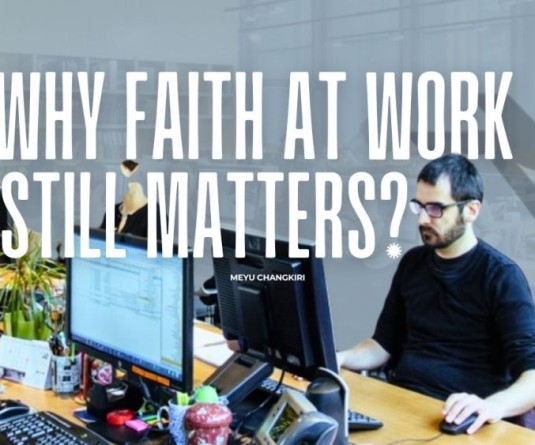
Kedo Peseyie
“Mission is the heartbeat of God.” We have heard that many times from our pulpits, in the missions’ newsletter and in books. Today the paradigm of doing missions may have changed and the focus shifted from jungles and rural areas to cities and towns. I am not very familiar with the changing trends in missions. But whatever the trend is, there is one thing I know for sure: the heartbeat of God cannot have changed.
This article is a result of a small personal reflection I had one afternoon. I was reading a book and came across the word “missions” and the importance of doing missions in the life of the church. Then I realised that I have not heard of that word for a very long time. I asked a friend when was the last time he heard the word missions, or a sermon on missions. He could not remember. I could not remember either. Maybe I missed it during a Sunday service. But whatever the confusion, one thing was clear: my heart had hardened and grown cold toward the things of God, especially missions.
And therefore I write this article with regret and guilt in my heart. But I write it with the hope that it will revive my zeal and your zeal for the things that are close to the heart of God.
The news in the newspapers and TV makes us very doubtful about finding a common dream for our people. Even the voice of the church is like a clanging cymbal (I mean, let’s face it. Nobody seems to be taking our voice seriously, or maybe they misinterpret it). And the other voices are like placing burning coals on our heads. It kills our faith, hope and love. In such a situation it seems highly unpractical and unpatriotic to be talking about other things like going out and preaching the gospel to others—missions. Of course it sounds more practical and relevant to talk about things like “Development” and “Development Wing” etc, within the church (someday we might even come to think that “a pig with wings” is practical). And the Devil has succeeded in getting us to think this way. (But why talk about patriotism also? Haven’t we forgotten that word too a very long time ago?)
Missions is clearly a biblical mandate. But we might argue that there are too many things we need to set right before we can look out to help others. We might also argue that if one is not willing to go out himself, he is a fool to talk about it. That sounds OK. And so let me be the fool today. The fact that God calls some people to go and some others to give and pray, and some others to motivate and organise doesn’t mean that only those who are willing to go have the moral authority to talk about it. But if something is wrong and nobody is talking about it, then it’s a double mistake and a double wrong. If there is salt missing in the curry and the whole family is sitting around the table silently eating because nobody wants to point out that salt is missing, there is something wrong with that family. Are we in that family too? I wonder.
I am not trying to earn the favour or the malice of anyone. R.T. Kendall once said that the reason why the city is in a sad condition is because the church is in a sad condition. Some of our Naga churches could be in the same condition. And the reason why the church is in a sad condition could be because our hearts are not beating with the heart of God. Somewhere along our journey from thatch houses to steel structures, we have developed the philosophy of “the bigger the building, the better.” I have come across villages where they start a massive church construction and stop halfway because they cannot go on anymore. Some of them stop because of financial constraints. And alas, some of them stop because the church has split up! And interestingly, many of the churches that split in this part of the world do so not because of major “theological” differences (whew!), but is often caused by clash of personal agendas, clans etc. It doesn’t make sense to me why the huge church building has to be kept empty, and half empty even on Sundays, while some families around and in neighbouring places don’t have a respectable home. In our towns people find it easier to finish the buildings they start. And it is more frightening there. K.P. Yohannan in his book “The Road to Reality” writes, “…social scientist say that the last signs of life in any movement comes when it starts to build monument-style buildings.” Don’t you think we have enough monuments already? Christianity will never die. But our hearts can grow cold. The bigger is not the better, the bigger could be our undoing.
If we begin to define our faith, conviction and mission by the huge structures that can be seen, touched, smelt and all that, and not by a revelation of the secret things of God, then maybe we have been spending more time counting bricks and very little time in the secret chamber on our knees. Jesus instructed us to pray to the Father for more labourers because the fields are ready for harvest and the labourers are so few. He did not tell us to occupy the land, he told us to go and make disciples. Where did we learn all of these? Is it from the TV?
And talking about TV, I am often saddened by the amount of money our people give to the Televangelist in a faraway-well-off country while our own Missionary Organisations struggle to keep its missionaries on the field. I am not always elevated by watching the televangelists perform on TV. I rarely tune in to their programmes. But one night I saw this man on the screen with his fist clenched, eyes shut wearing a well-pressed expensive suit praying really hard. I said to my wife Karen, “Hey, isn’t this man doing exactly the opposite of what Jesus told his followers to do?” Jesus instructed His followers to go inside the closet and pray in secret so that the father who sees in secret will reward those who pray sincerely. Maybe the man was praying so hard that he forgot a camera was before him. But that is highly unlikely because he later looked straight at the camera and asked for a donation. (Sometimes I wonder why only Christian channels ask for donations.) We like to pray in public and our mass prayers could take the roof off the church. But do we really, sincerely pray in private for the things that are close to the heart of God? With God’s help, it is time we do if we want God to restore our people back to Himself.
There is another point to make. Somewhere along our bloody political journey, the church has come to believe that we need to settle the political issues first before we can think about other things like missions. I am not very sure whether this is the right way to think and act. If I am wrong, then I’ll have to pay for it. But I believe I am right. Many of our talented church leaders and church organisations have wasted much of their energy in trying to solve our political imbroglio. They are noble causes no doubt, but not when the heartbeat of God is weakened in our hearts and when his purposes lie in ruins. I am not advocating that we detach ourselves from these pertinent issues. I only mean that we should be careful not to confuse political obligations with Divine mandates. But I am afraid we have done something like that. Why else do we say “Nagaland for Christ”? Is that a desperate attempt to save a frustrated despotic ambition by connecting it with a divine mandate to arouse the religious sentiments of a people? It will not succeed.
Having said all of these, let me assure you that I do have strong patriotic feelings too. And I strongly believe that things in the society will begin to fall into place when the church begins to take back its place of authority, truth and its role in God’s mission. R.T. Kendall, the respected Biblical expositor said, “The trouble with the world today is to be traced back to the sad state of the church…The church has spent its energy, its time and its money on the wrong things…the church has lost its authority because it is not preaching the message that God gave her to deliver to the world.”
These lines by Kendall are like a knife cutting into our hearts. In the coming years, I hope these lines will not be used to describe our Naga churches. May God restore back His bride to Himself. And may it begin with us today.





